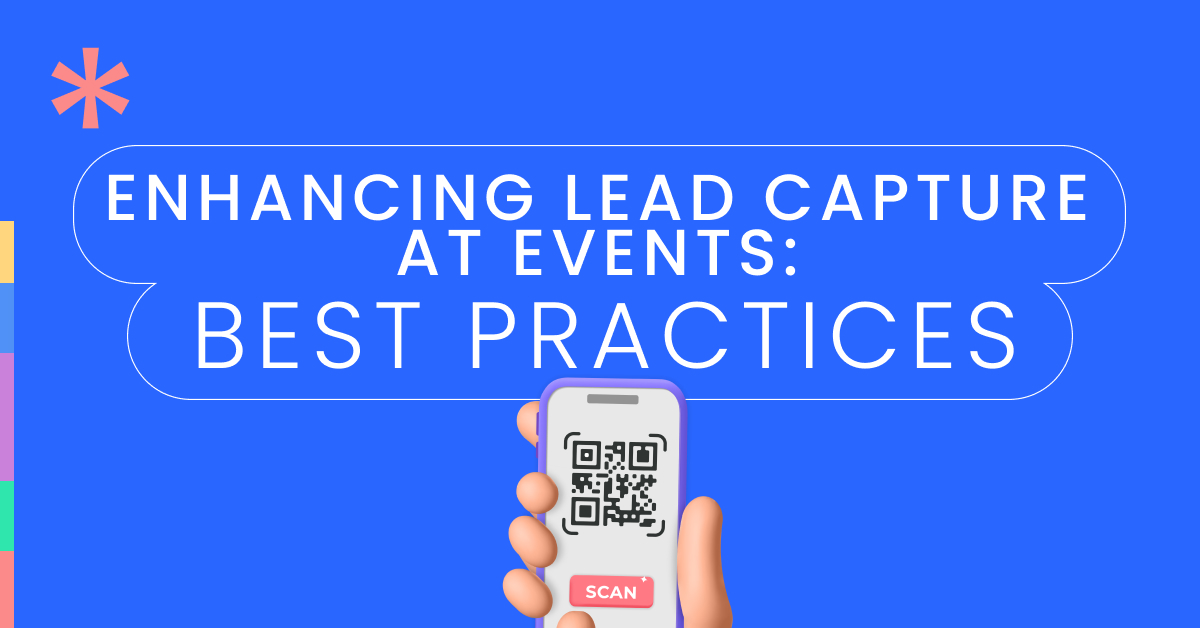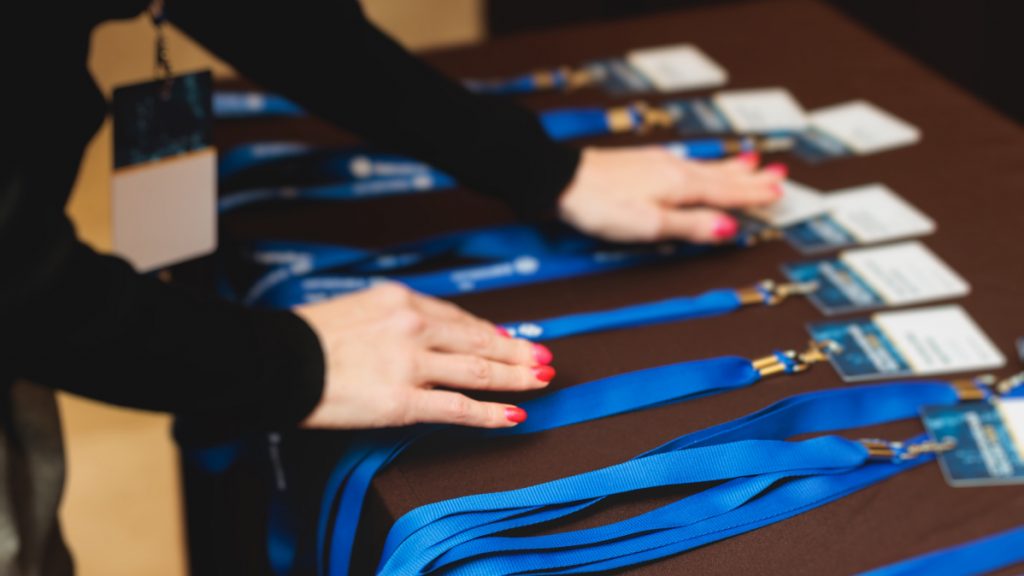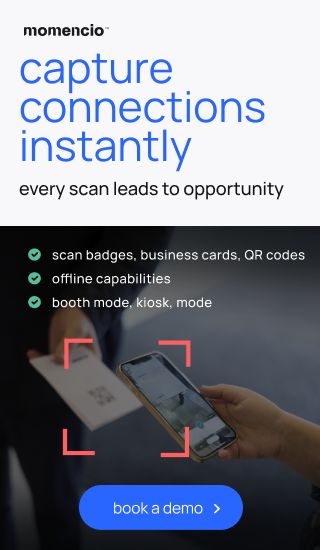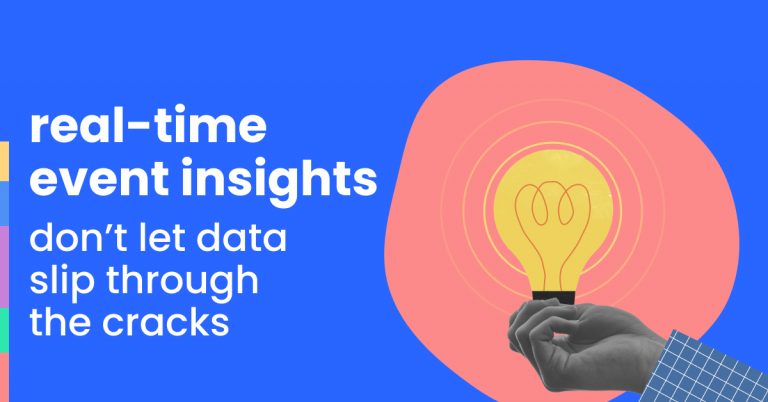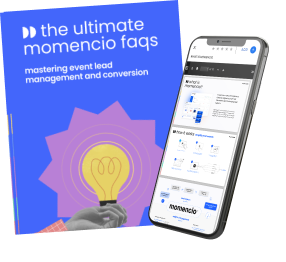Capturing leads effectively at events is a critical component of successful event marketing. As events provide a unique opportunity for face-to-face interactions with potential clients, the ability to capture and follow up with leads efficiently can significantly impact a company’s sales pipeline and ROI.
Statistics show that 79% of marketers consider events crucial to their company’s success, highlighting the importance of optimizing lead capture strategies. However, despite advancements in technology, many event professionals still need help with common pitfalls such as delayed follow-ups and manual data entry, which can hinder their efforts to convert leads into sales.
Effective Strategies for Capturing Leads at Events
Capturing leads at events involves more than simply collecting business cards; it requires a strategic approach that leverages the latest technology to ensure data accuracy and efficiency. Here are some of the most effective strategies for lead capture at events:
Digital Badge Scanning
Digital badge scanning technology has revolutionized the way leads are captured at events. This method involves scanning the badges of attendees using handheld devices or mobile apps, instantly capturing their contact information. The benefits of digital badge scanning include:
- Accuracy and Speed: Digital scanning reduces the likelihood of errors associated with manual data entry and speeds up the lead capture process.
- Real-Time Data Integration: The captured data can be immediately integrated into CRM systems, allowing for real-time follow-up and analysis.
- Enhanced Data Collection: Additional information, such as session attendance and booth interactions, can be tracked through badge scans.
Mobile Apps for Lead Retrieval
Mobile lead retrieval apps are another powerful tool for event professionals. These apps, such as Cvent LeadCapture and Boomset, offer functionalities like note-taking, tagging, and instant follow-up capabilities. Key features of mobile apps for lead retrieval include:
- Convenience: Leads can be captured anywhere at the event, whether at booths, sessions, or networking areas.
- Customization: Information can be customized with tags and notes to personalize follow-ups.
- Integration: Data captured through mobile apps can be seamlessly integrated with CRM systems, ensuring no lead is lost.
RFID and NFC Technology
Radio-frequency identification (RFID) and near-field communication (NFC) are advanced technologies used to enhance lead capture. These technologies allow for contactless data exchange between attendee badges and event systems. The advantages of RFID and NFC include:
- Seamless Tracking: Attendee movements and interactions can be tracked effortlessly, providing valuable insights into their interests and behavior.
- Improved Engagement: These technologies facilitate interactive experiences, such as gamified check-ins and instant content sharing, which can boost engagement and lead capture.
- Data Richness: RFID and NFC enable the collection of detailed attendee data, which can be used for personalized marketing and follow-up.
Interactive Demos and Surveys
Providing interactive product demonstrations and engaging attendees with surveys can be highly effective in capturing leads. These strategies not only attract attendees to your booth but also gather valuable information about their preferences and needs. Tips for effective interactive demos and surveys include:
- Engaging Content: Ensure that your demos are engaging and informative, highlighting the key benefits of your products or services.
- Immediate Feedback: Surveys can be used to collect immediate feedback from attendees, which can be used to tailor follow-up communications.
- Incentives: Offer incentives, such as giveaways or discounts, for completing surveys to encourage participation.
Gamification
Gamification involves incorporating game-like elements into your event strategy to engage attendees and capture leads. This can include contests, scavenger hunts, or interactive games that encourage attendees to visit your booth and participate in activities. Benefits of gamification include:
- Increased Engagement: Games and contests attract attendees and keep them engaged longer, providing more opportunities to capture leads.
- Data Collection: Gamification can be used to collect information about attendees’ interests and behaviors, which can be valuable for follow-up.
- Memorable Experiences: Creating a fun and interactive experience helps your brand stand out and makes it more likely that attendees will remember you.
Personalized Content and Follow-Up
Personalizing your content and follow-up communications based on the interests and interactions of leads is crucial for effective lead capture. Strategies for personalized follow-up include:
- Segmenting Leads: Segment your leads based on their interests, behaviors, and demographics to tailor your follow-up messages.
- Automated Emails: Use marketing automation tools to send personalized follow-up emails immediately after the event, ensuring timely engagement.
- Customized Content: Provide content that is relevant to each lead’s specific needs and interests, increasing the likelihood of conversion.
By implementing these strategies, event professionals can significantly enhance their lead capture efforts, ensuring that every interaction at the event contributes to their sales pipeline and business growth.
How Technology Improves the Lead Capture Process
Advancements in technology have transformed the way leads are captured and managed at events. The integration of various tools and platforms not only streamlines the process but also provides deeper insights and more effective follow-up strategies. Here’s how technology improves the lead capture process:
Automation Tools
Automation tools play a critical role in improving lead capture efficiency and accuracy. They eliminate the need for manual data entry and ensure that leads are captured and followed up promptly. Key benefits of automation tools include:
- Efficiency: Automating the lead capture process saves time and reduces the risk of errors. Automation tools can capture, store, and organize lead information without the need for manual intervention.
- Consistency: Automated systems ensure that all leads are captured consistently and accurately. This standardization helps maintain the quality of data collected from various sources.
- Scalability: Automation allows for the capture of a large number of leads without overwhelming your team. Whether your event attracts hundreds or thousands of attendees, automation tools can handle the volume efficiently.
Popular automation tools for lead capture at events include platforms like HubSpot, Marketo, and Salesforce. These tools provide comprehensive solutions for capturing leads, nurturing them, and integrating them with existing CRM systems to streamline the follow-up process.
Real-Time Data Integration
Real-time data integration is essential for effective lead capture and follow-up. By integrating data captured at events with your CRM system in real time, you can ensure that your sales and marketing teams have immediate access to the information they need. Benefits of real-time data integration include:
- Immediate Follow-Up: Real-time integration enables immediate follow-up with leads, increasing the likelihood of conversion. Sales teams can respond to inquiries and engage with prospects while the event is still fresh in their minds.
- Data Accuracy: Real-time data capture and integration reduce the risk of data loss and ensure that all information is accurate and up-to-date. This accuracy is crucial for making informed decisions and developing effective follow-up strategies.
- Insightful Analytics: Access to real-time data allows for more insightful analysis and better decision-making. Event professionals can track lead interactions, measure engagement levels, and adjust their strategies based on real-time feedback.
Technologies like API integrations, cloud-based CRM systems, and real-time data dashboards are instrumental in facilitating seamless data integration. Platforms like Zapier and MuleSoft enable the integration of various applications, ensuring that data flows smoothly between different systems.
Interactive Demos and Surveys
Interactive product demonstrations and engaging surveys can significantly enhance lead-capture efforts. These strategies not only attract attendees to your booth but also provide valuable insights into their preferences and needs. Tips for effective interactive demos and surveys include:
- Engaging Content: Ensure that your demos are engaging and informative, highlighting the key benefits of your products or services. Use visuals, hands-on activities, and live demonstrations to capture attendees’ attention and interest.
- Immediate Feedback: Surveys can be used to collect immediate feedback from attendees, which can be used to tailor follow-up communications. Interactive surveys can be conducted via tablets, kiosks, or mobile apps, making it easy for attendees to provide their input.
- Incentives: Offer incentives, such as giveaways or discounts, for completing surveys to encourage participation. This approach not only increases engagement but also provides a tangible reward for attendees’ time and effort.
Interactive demos and surveys are powerful tools for capturing detailed information about attendees’ interests and behaviors. Platforms like SurveyMonkey, Typeform, and Google Forms offer customizable survey templates that can be tailored to fit the specific needs of your event. Additionally, incorporating elements like QR codes and NFC tags can make the process even more seamless and engaging.
Engagement Techniques to Enhance Lead Capture
Capturing leads effectively at events goes beyond merely collecting contact information. Engaging attendees in meaningful ways ensures that they are more likely to provide their details and remain interested in your offerings. Here are some innovative engagement techniques to enhance lead capture at events:
Gamification
Gamification involves incorporating game-like elements into your event strategy to engage attendees and capture leads. This approach can transform mundane interactions into fun and memorable experiences, encouraging attendees to participate and share their information. Benefits of gamification include:
- Increased Engagement: Games and contests attract attendees and keep them engaged longer, providing more opportunities to capture leads. By making the experience enjoyable, attendees are more likely to participate and interact with your brand.
- Data Collection: Gamification can be used to collect information about attendees’ interests and behaviors. For example, a scavenger hunt that requires participants to visit different booths can provide insights into which products or services they are most interested in.
- Memorable Experiences: Creating a fun and interactive experience helps your brand stand out and makes it more likely that attendees will remember you. This lasting impression can facilitate future interactions and follow-ups.
Examples of Gamification at Events:
- Interactive Quizzes and Polls: Set up quizzes related to your industry or products. Attendees can answer questions using tablets or smartphones, and those with the highest scores can win prizes.
- Scavenger Hunts: Organize a scavenger hunt where attendees must visit specific booths or stations to collect stamps or codes. This encourages exploration and engagement with various aspects of the event.
- Spin-to-Win Wheels: Create a digital or physical wheel that attendees can spin to win prizes. Collect their contact information as an entry requirement.
Personalized Content and Follow-Up
Personalizing your content and follow-up communications based on the interests and interactions of leads is crucial for effective lead capture. Tailored messages and content can significantly increase engagement and conversion rates. Strategies for personalized follow-up include:
- Segmenting Leads: Segment your leads based on their interests, behaviors, and demographics to tailor your follow-up messages. This segmentation allows you to send relevant content that resonates with each group.
- Automated Emails: Use marketing automation tools to send personalized follow-up emails immediately after the event. These emails should reference specific interactions or interests expressed by the lead during the event.
- Customized Content: Provide content that is relevant to each lead’s specific needs and interests. This could include whitepapers, case studies, or product information that addresses their pain points.
Implementing Personalized Content and Follow-Up:
- Data Collection: Use lead capture forms, surveys, and interactions at the event to gather detailed information about attendees’ preferences and interests.
- Marketing Automation: Platforms like HubSpot, Marketo, and Salesforce allow you to automate the follow-up process. Set up workflows that trigger personalized emails based on the data collected.
- Dynamic Content: Use dynamic content in your emails and landing pages to tailor the message to each recipient. This can include personalized greetings, product recommendations, and relevant resources.
Example of a Personalized Follow-Up Email:
Subject: Thank You for Visiting Us at [Event Name]!
Hi [First Name],
Thank you for stopping by our booth at [Event Name]. It was a pleasure speaking with you about [specific topic or product discussed].
Based on our conversation, I thought you might find the following resources helpful:
– [Resource 1]: A comprehensive guide to [related topic].
– [Resource 2]: A case study on how we helped a client achieve [specific result].
– [Resource 3]: A demo of our .
If you have any questions or would like to schedule a follow-up meeting, please don’t hesitate to reach out.
Best regards,
By implementing gamification and personalized content strategies, you can significantly enhance lead-capture efforts at events. These techniques not only engage attendees more effectively but also ensure that the leads you capture are more qualified and interested in your offerings.
Common Mistakes to Avoid When Capturing Leads
While there are numerous strategies and technologies available for effective lead capture at events, there are also common mistakes that can hinder your efforts. Avoiding these pitfalls is crucial to maximizing your event’s ROI and ensuring successful lead conversion. Here are some common mistakes to avoid when capturing leads at events:
Delayed Follow-Up
One of the most common mistakes in lead capture is delaying follow-up communications. Leads that should be followed up promptly can quickly turn cold, reducing the likelihood of conversion. Best practices for timely follow-up include:
- Immediate Engagement: Use automation tools to send follow-up emails immediately after the event. These tools can be programmed to send personalized messages based on the information captured at the event.
- Personalized Messages: Ensure that follow-up messages are personalized and relevant to the lead’s interests and interactions. Reference specific discussions or interactions to show that you value their engagement.
- Consistent Communication: Maintain consistent communication with leads to keep them engaged and moving through the sales funnel. Schedule follow-up reminders and check-ins to ensure ongoing engagement.
Manual Data Entry
Relying on manual data entry for lead capture can lead to errors and inefficiencies. Manual processes are time-consuming and prone to mistakes, which can result in lost or inaccurate data. Strategies to avoid manual data entry include:
- Automation: Utilize automation tools for lead capture and data integration to eliminate the need for manual entry. Tools like badge scanners, lead retrieval apps, and automated CRM systems can streamline the process.
- Digital Solutions: Employ digital badge scanning, mobile apps, and other digital solutions for capturing leads. These tools ensure accurate data collection and reduce the burden on your staff.
- Training: Ensure that your team is trained on the use of lead capture technology to maximize efficiency and accuracy. Please provide them with the necessary resources and support to use these tools effectively.
Example of Automated Data Entry Process:
- Badge Scanning: Use digital badge scanners to capture attendee information quickly and accurately.
- Mobile Apps: Employ mobile lead retrieval apps to gather data on the go and integrate it directly into your CRM.
- Real-Time Sync: Ensure that all captured data is automatically synced with your CRM system in real time, eliminating the need for manual data entry.
Ignoring Non-Digital Leads
While digital solutions are essential for efficient lead capture, it’s also vital to recognize non-digital leads, such as business cards and handwritten notes. Strategies for capturing non-digital leads include:
- Business Card Scanners: Use business card scanners to digitize contact information quickly. Many mobile apps can scan and convert business card details into digital format, which can then be integrated into your CRM.
- Manual Entry as Backup: Have a process in place for manually entering non-digital leads into your CRM system if necessary. Ensure that this data is captured accurately and promptly.
- Integration: Ensure that all lead data, whether digital or non-digital, is integrated into your CRM system for comprehensive follow-up. This integration helps maintain a complete and accurate database of all event leads.
Example of Capturing Non-Digital Leads:
- Business Card Scanner App: Use an app like CamCard or ScanBizCards to quickly scan business cards and upload the information to your CRM.
- Manual Entry Protocol: Establish a protocol for manually entering information from handwritten notes or business cards that cannot be scanned. Assign a team member to ensure this data is captured accurately and promptly.
- CRM Integration: Integrate all lead data into your CRM system to ensure comprehensive follow-up and tracking.
By avoiding these common mistakes and implementing best practices for lead capture, event professionals can ensure that their efforts result in successful lead conversion and increased ROI. Ensuring timely follow-up, leveraging automation, and capturing all types of leads will help maximize the impact of your event marketing efforts.
If you want to know more about momencio and what it does, we answer all the important questions in a free ebook. Download it here
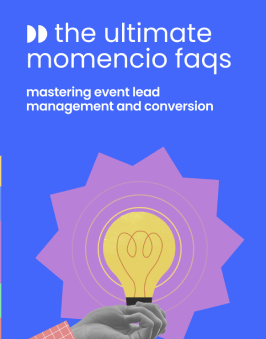
How momencio’s AI Lead Enrichment Enhances Lead Capture
Integrating AI technology into the lead capture process can significantly improve the quality and effectiveness of the leads collected at events. momencio’s AI lead enrichment is designed to provide deeper insights into your leads, ensuring more personalized and effective follow-up strategies. Here’s how momencio’s AI lead enrichment enhances lead capture:
AI-Driven Data Enrichment
momencio’s AI lead enrichment goes beyond basic contact information by adding valuable data points to each lead profile, creating a comprehensive understanding of each prospect.
- Enhanced Lead Profiles: The AI enriches lead profiles with additional details such as company information, job titles, and social media profiles. This additional context helps in better understanding each lead’s potential.
- Real-Time Updates: As leads interact during the event, the AI continuously updates their profiles with new data, ensuring that your CRM always has the most accurate and up-to-date information.
Example of AI-Driven Data Enrichment:
- Enhanced Profiles: momencio’s AI enriches lead profiles by pulling in additional data, such as job titles, company information, and social media profiles.
- Continuous Updates: The AI updates lead information in real time based on interactions and new data acquired during the event.
Real-Time Analytics and Insights
momencio’s AI provides real-time analytics and insights, allowing for immediate adjustments and optimization of your lead capture strategy. Benefits include:
- Real-Time Dashboard: View real-time data on lead engagement, booth traffic, and session attendance, enabling on-the-spot decisions and adjustments.
- Insightful Reports: Generate detailed reports on lead quality, engagement metrics, and conversion likelihood, helping refine your approach for future events.
Conclusion
Incorporating successful strategies and learning from real-world examples can significantly enhance your lead capture efforts at events. By leveraging techniques such as gamification, real-time data integration, and interactive demos, you can engage attendees more effectively and gather valuable data for personalized follow-ups. Implementing these best practices will help ensure that every interaction at your event contributes to your sales pipeline and business growth.
Ready to transform your lead capture process and maximize your event ROI? Discover how momencio can help you streamline lead capture, enhance engagement, and drive sales growth. Book a demo today and see the difference for yourself!
FAQs – Lead capture at events
- What is the most effective way to capture leads at events?
- The most effective way to capture leads at events is by using a combination of digital badge scanning, mobile lead retrieval apps, and RFID/NFC technology to ensure accurate and efficient data collection.
- How can I improve my follow-up process after capturing leads at an event?
- Improve your follow-up process by using automation tools to send personalized follow-up emails immediately after the event, segmenting leads based on their interests, and maintaining consistent communication.
- What are the common mistakes to avoid when capturing leads at events?
- Common mistakes to avoid include delayed follow-up, relying on manual data entry, and ignoring non-digital leads such as business cards.
- How does gamification enhance lead capture at events?
- Gamification enhances lead capture by increasing attendee engagement through interactive and fun activities, which can attract more leads and provide valuable data for follow-up.
- Why is real-time data integration important for lead capture?
- Real-time data integration is important because it enables immediate follow-up, ensures data accuracy, and provides insightful analytics for better decision-making.
Interesting Facts from Research
- According to Event Marketing 2020, 79% of marketers believe events are critical to their company’s success.
- Companies that automate lead management see a 10% or greater increase in revenue in 6-9 months (MarketingProfs).
